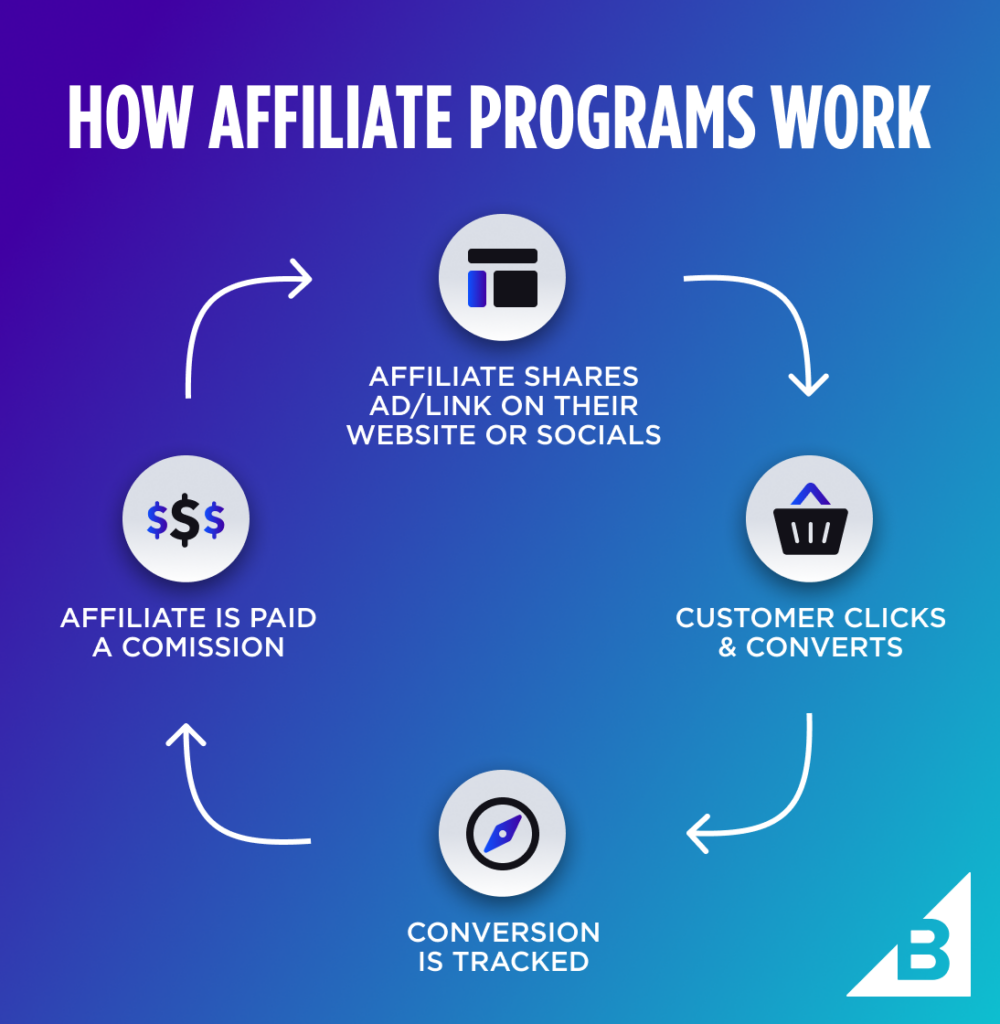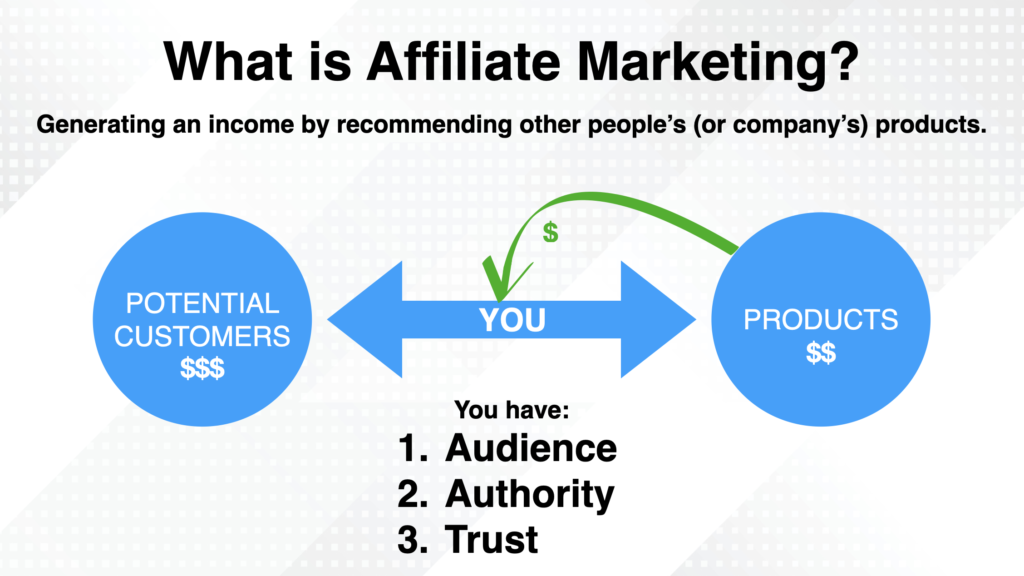Have you ever wondered what exactly an affiliate marketer does? Well, you’re in luck because in this article, we’re going to break it down for you. Affiliate marketing is a popular way to make money online, but many people still don’t fully understand what it entails. So, if you want to learn more about the exciting world of affiliate marketing, keep reading!
What Exactly Does An Affiliate Marketer Do?
In simple terms, an affiliate marketer promotes products or services on behalf of a business and earns a commission for every sale or lead they generate. It’s sort of like being a middleman between the company and the consumer. As an affiliate marketer, you don’t need to worry about creating your own products or dealing with customer service. Instead, you focus on driving traffic and sales to the company’s website through various marketing strategies.
In this article, we’ll delve deeper into the different aspects of affiliate marketing, such as choosing the right affiliate programs, creating engaging content, and maximizing your earnings. So, if you’re interested in learning more about this dynamic and lucrative industry, keep reading and we’ll provide all the details you need to get started as an affiliate marketer.
Understanding Affiliate Marketing
Affiliate marketing is a performance-based marketing strategy that allows individuals or businesses, known as affiliate marketers, to earn a commission by promoting products or services for other companies. It is a win-win situation where the affiliate marketer receives a percentage of the revenue generated from their promotional efforts, while the company gains exposure and potential customers.
Defining Affiliate Marketing
In affiliate marketing, the affiliate marketer acts as a middleman between the company and the consumer. They promote products or services through various marketing channels, such as websites, blogs, social media platforms, and email marketing, and earn a commission for every sale or lead generated through their efforts.
Key Players in Affiliate Marketing
There are three main players in the affiliate marketing ecosystem:
- The Merchant: Also known as the advertiser or the company selling the product or service. They provide the affiliate program and pay the commission to the affiliate marketer based on agreed-upon terms.
- The Affiliate Network: An intermediary platform that connects the merchant and the affiliate marketer. It provides the necessary tools and tracking systems to facilitate the affiliate marketing process.
- The Affiliate Marketer: The individual or business that promotes the merchant’s products or services. They create marketing campaigns, drive traffic to the merchant’s website, and earn a commission for each successful referral.
The Role of an Affiliate Marketer
As an affiliate marketer, your primary role is to drive targeted traffic to the merchant’s website and generate sales or leads. To accomplish this, you need to have a deep understanding of your target audience, choose a profitable niche, and create compelling marketing campaigns.
Becoming an Affiliate Marketer
If you are interested in becoming an affiliate marketer, here are the steps you need to take:
Choosing a Profitable Niche
Selecting a profitable niche is crucial for your success as an affiliate marketer. You need to identify a niche that has a high demand, low competition, and good profit potential. Conduct market research to understand consumer needs and preferences and find a niche that aligns with your interests and expertise.
Finding Affiliate Programs
Once you have chosen your niche, you need to find affiliate programs that offer products or services relevant to your niche. There are several ways to find affiliate programs:
- Search on affiliate networks such as Commission Junction, ShareASale, and Amazon Associates.
- Look for individual companies with affiliate programs by visiting their websites and checking for affiliate program information.
- Join affiliate marketing forums and communities to get recommendations and insights from experienced affiliate marketers.
Building an Online Presence
To be a successful affiliate marketer, you need to establish a strong online presence. This involves creating a website or blog where you can promote products and provide valuable content to your audience. Your website should be user-friendly, visually appealing, and optimized for search engines.
Additionally, you should leverage social media platforms to engage with your audience and expand your reach. Build a following and regularly share relevant and engaging content to attract potential customers.

Generating Traffic
Once you have set up your online presence, your next step as an affiliate marketer is to generate targeted traffic to your website. Here are some strategies to accomplish this:
Creating High-Quality Content
Content is king in the digital marketing world. By creating high-quality and valuable content, you can attract organic traffic to your website. Write blog posts, articles, or product reviews that provide useful information and solve problems for your target audience. Optimize your content for search engines by incorporating relevant keywords, meta tags, and internal linking.
Implementing SEO Strategies
Search engine optimization (SEO) plays a crucial role in driving organic traffic to your website. Optimize your website with on-page and off-page SEO techniques such as keyword research, link-building, and website speed optimization. By ranking higher in search engine results, you increase your chances of being discovered by potential customers.
Engaging with Social Media
Social media platforms are essential for affiliate marketers to connect with their target audience and promote their products. Create engaging and shareable content that resonates with your followers. Interact with your audience by responding to comments, asking questions, and running contests or giveaways. Utilize social media advertising to amplify your reach and drive traffic to your website.
Utilizing Email Marketing
Email marketing is a powerful tool for nurturing leads and driving traffic to your affiliate offers. Build an email list by offering valuable content or incentives in exchange for email addresses. Segment your list based on interests and preferences and send personalized emails with product recommendations and promotional offers. Use catchy subject lines and persuasive call-to-actions to increase open and click-through rates.
Building and Cultivating Relationships
Building and cultivating relationships is essential for long-term success as an affiliate marketer. Here are some strategies to connect with your target audience and fellow marketers:
Connecting with Target Audience
Engage with your audience by responding to comments, messages, and inquiries. Be transparent and authentic in your interactions. Conduct surveys or polls to understand their needs and preferences. Use your website analytics and social media insights to gather data on their demographics and behavior. This information will help you tailor your marketing campaigns and provide personalized recommendations.
Networking with Fellow Marketers
Participate in affiliate marketing communities, forums, YouTube channels and social media groups to connect with fellow marketers. Share insights, tips, and strategies. Collaborate on projects or joint ventures. By networking with experienced marketers, you can learn from their successes and failures, broaden your knowledge, and gain new opportunities.
Collaborating with Influencers
Influencer marketing has become a popular strategy for affiliate marketers. Collaborate with influencers relevant to your niche to promote your affiliate offers. Partner with them in content creation, such as guest blogging or co-hosting webinars. Influencers have a loyal following and can help extend your reach and credibility among their audience.

Promoting Products and Services
As an affiliate marketer, your ultimate goal is to promote products and services to your target audience. Here’s how you can effectively promote them:
Identifying and Evaluating Products
Choose products or services that align with your niche and target audience. Conduct thorough research on the merchant and their offerings. Evaluate the quality, relevance, and value of the products. Consider the commission rates, refund policies, and customer support provided by the merchant.
Crafting Effective Marketing Campaigns
Create compelling marketing campaigns that resonate with your target audience. Use storytelling, emotions, and persuasive techniques to capture their attention and convince them of the benefits of the products or services. Utilize various marketing channels such as social media, email marketing, and paid advertising to reach and engage your audience.
Utilizing Affiliate Links and Tracking
When promoting products, utilize affiliate links provided by the merchant. These links contain unique identifiers that track the traffic and sales generated from your promotional efforts. Implement tracking tools such as Google Analytics or affiliate network tracking systems to monitor your campaigns’ performance and optimize your strategies accordingly.
Monitoring and Analyzing Performance
To ensure your affiliate marketing efforts are effective, you need to constantly monitor and analyze their performance. Here are some key areas to focus on:
Tracking Clicks, Leads, and Sales
Use tracking tools to monitor the number of clicks, leads, and sales generated from your marketing campaigns. Measure the conversion rates and identify areas for improvement. A/B test different campaign variations to determine the most effective strategies.
Implementing Tracking Tools
Implement tracking tools like Google Analytics, UTM codes, and pixels to gather data on your website visitors’ behavior and demographics. Analyze this data to gain insights into your audience’s preferences, interests, and purchasing patterns. Use these insights to refine your marketing messages and strategies.
Analyzing Data to Optimize Results
Regularly analyze your data to identify trends, patterns, and areas for improvement. Optimize your marketing campaigns based on data insights. Make data-driven decisions regarding your promotional strategies, audience targeting, and content creation.

Optimizing Conversion Rates
Increasing your conversion rates is essential for maximizing your affiliate marketing earnings. Here are some strategies to optimize your conversion rates:
Improving Landing Pages
Your landing page is the first impression your audience has of your offer. Optimize your landing pages for user experience and conversion. Use persuasive copywriting, compelling visuals, and clear call-to-actions. Perform A/B testing to identify the most effective elements and layout.
Enhancing User Experience
Ensure that your website or blog provides a seamless and user-friendly experience. Optimize for mobile devices, improve website speed, and make navigation intuitive. Address any technical issues promptly and provide excellent customer support.
Testing and Tweaking Strategies
Continuously test different marketing strategies to identify the most effective ones. Experiment with different ad placements, copywriting styles, visuals, and offers. Track the results and make data-driven decisions on what to scale up and what to tweak or discard.
Dealing with Challenges and Obstacles
Affiliate marketing is not without its challenges and obstacles. As an affiliate marketer, you need to be prepared to overcome them:
Competition and Market Saturation
Competition in the affiliate marketing industry is fierce. To stand out, you need to differentiate yourself by offering unique value, creating compelling content, and building strong relationships with your audience. Stay updated with industry trends and constantly innovate to stay ahead of the competition.
Adapting to Market Trends
The world of digital marketing is constantly evolving. Stay updated with the latest market trends, consumer behavior shifts, and technological advancements. Adapt your strategies accordingly to stay relevant and capitalize on new opportunities.
Overcoming Discouragement and Burnout
Affiliate marketing requires perseverance and resilience. It can be challenging at times, especially when results take longer to materialize. Stay motivated by setting realistic goals, celebrating small wins, and seeking support from fellow affiliate marketers or mentors. Take breaks and practice self-care to prevent burnout.

Staying Up-to-Date and Continuous Learning
To excel in affiliate marketing, you need to stay up-to-date with industry news and continuously update your knowledge and skills. Here are some ways to achieve this:
Following Industry News and Updates
Subscribe to industry newsletters, blogs, and podcasts to stay informed about the latest trends, strategies, and changes in affiliate marketing. Follow thought leaders and experts on social media to gain insights and learn from their experiences.
Attending Conferences and Webinars
Attend affiliate marketing conferences, webinars, and workshops to network with industry professionals and learn from their expertise. These events provide opportunities to gain insights, discover new tools and techniques, and connect with potential business partners or merchants.
Exploring New Marketing Techniques
Be open to exploring new marketing techniques and tools. Experiment with emerging trends such as influencer marketing, video marketing, or voice search optimization. By embracing new marketing approaches, you stay ahead of the curve and attract a wider audience.
Conclusion
In conclusion, an affiliate marketer plays a critical role in connecting consumers with products and services they need. As an affiliate marketer, you need to continuously learn, adapt, and optimize your strategies to earn commissions and build a successful online business. By choosing a profitable niche, generating targeted traffic, building relationships, promoting products effectively, and staying up-to-date with industry trends, you can become a successful affiliate marketer and achieve your financial goals.
